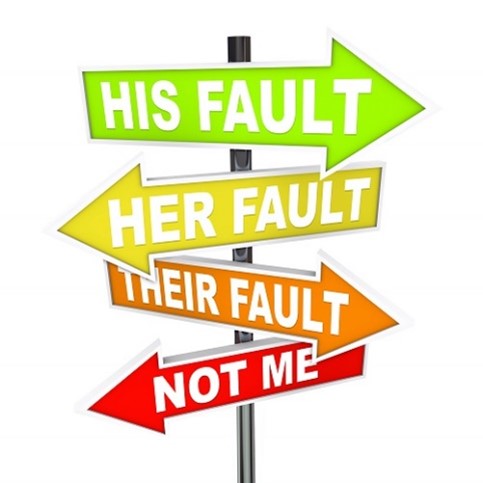The Trap of Blaming Others
When things aren’t going your way, it may be tempting to deflect attention from your own role in things and blame others. Perhaps you’re blaming your spouse. Or boss. Perhaps you’re blaming a friend or colleague. Or the economy or inflation—or politicians, the media, or a rival political party. Your parents, or your circumstances.
Blaming may give you a feeling of satisfaction as you look outside for responsibility and wallow in the unfairness of it all. But that feeling is fleeting. In the meantime, you haven’t moved forward at all. In fact, you’ve moved backward.
“No good comes from blame.”
– Kate Summers
Signs of Blaming

How to tell if you’re blaming others? When blaming, you’re likely:
- holding others responsible for your own frustrations and problems
- expecting others to change to suit your needs
- showing defensiveness
- causing emotional escalation with the person and issue at hand
“It is far more useful to be aware of a single shortcoming in ourselves
than it is to be aware of a thousand in somebody else.”
– Dalai Lama
The Problem with Blaming Others

“Wherever you find a problem, you will usually find the finger-pointing of blame.
Society is addicted to playing the victim.”
– Stephen R. Covey, The 7 Habits of Highly Effective People
Though it may feel good in the moment, blaming comes with many problems:
- Most importantly, it doesn’t work. You don’t move forward in any way, shape, or form when you’re blaming. (“The blame game is a waste of time. Any time you’re busy fixing blame, you’re wasting energy and not fixing the problem.” -Rick Warren)
- It often backfires, making things worse.
- Blaming robs you of your own agency.
- It makes people defensive.
- Blaming damages relationships. (People don’t like it at all when they’re the target of blaming.)
- It reduces your productivity and effectiveness.
- Blaming often entails lying—bending the truth to minimize or eliminate your own responsibility while exaggerating the fault of others. As such, it harms your credibility.
- You suffer the most, not the person you’re blaming.
- Blaming leads to escalation into bigger issues—especially when it’s unfair blame or blame that misses important contextual factors because you don’t have all the information you need.
- You don’t learn from mistakes since you’re focused on the fault of others.
- Blaming can lead to other negative emotions—such as anger, resentment, or even hatred or rage—which are even worse.
- It can rob you of your potential influence on others.
- Apparently, blaming can be contagious, leading others to fall into this trap as well in a downward spiral.
“Blame is fascinating—it shapes our lives. It can be a benign way of positioning ourselves,
a gentle joust or banter, or it can be poisonous, hurtful, or devastating for its victims.
It can tear apart marriages and fracture work relationships;
it can disable major social programs; it can inflict damage on powerful corporations;
it can bring down governments; it can start wars and justify genocides.”
– Stephen Fineman, The Blame Business
Why You Blame
It’s natural and common to play the blame game. But that doesn’t mean it will serve you well. Your brain my subconsciously leap to blaming by default. What’s going on here?
Blaming is an odd combination of defense mechanism and attack strategy. You’re defending your precious ego by attacking another person with the assignment of fault. It’s a way to avoid or release negative emotions.
Blaming preserves your self-esteem by helping you avoid responsibility for mistakes. You want to be right and win the argument to protect your fragile ego. By blaming others, you feel like you can escape guilt and responsibility.
Blaming is also a form of social comparison, allowing you to feel superior and gifted with greater social status, at least in the situation at hand.
Also, blaming can come with perfectionism, giving us a way to maintain our illusion of perfection as we find fault in others instead of ourselves.
How to Avoid the Blame Game
So far in this article, you’ve seen what blaming is, the signs of blaming in action, the many problems with it, and why we do it so much.
But you can’t stop there. You need to know what to do about it—and what to do instead. Here are six top tips for avoiding the blame game:
- Stop ruminating on the problems at hand and turn your attention instead toward something more positive.
- Practice empathy and try to understand the context, motivations, and feelings of the other person. Work to account for the other person’s perspective. Ask questions and explore their perspective.
- Focus on finding a solution, not a scapegoat. In the end, that’s most important.
- Instead of assigning all the blame to another person, try a “50-50” split instead: assume equal responsibility for the problem, or at least joint responsibility. Ultimately, the allocation of blame matter much less than resolving the issues well.
- Focus on collaboration, not blame. Consider ways in which teaming up to address the issues may benefit you both and avoid unnecessary emotional potholes.
- Take full responsibility for your life, choices, behaviors, and outcomes, even if there are outside factors present (as there always are). It’s a powerful practice that will serve you well.
Final Thoughts
Though blaming is common and natural, don’t trade in it. It’s a trap. Blaming gets you nowhere fast and will even take you backward and cause damage. By avoiding the tram of blaming, you can improve your mental state, quality of life, relationships, leadership, and effectiveness.
“It’s always easy to blame others. You can spend your entire life blaming the world,
but your successes or failures are entirely your own responsibility.”
– Paolo Coelho, Brazilian novelist
++++++++++++++++++++++
Reflection Questions
- Are you playing the blame game?
- Is it serve you well—or harming you?
- Which of the top tips for avoiding blame will you try, starting today?
Wishing you well with it.

–Gregg Vanourek
++++++++++++++++++
Postscript: Inspirations on Avoiding the Blame Trap
- “When we blame, we give away our power.” – Greg Anderson
- “To grow up is to stop putting blame on parents.” – Maya Angelou
- “One of the most important ways to manifest integrity is to be loyal to those who are not present. In doing so, we build the trust of those who are present.” – Stephen R. Covey
- “You become a victim when you blame yourself or others for some problem or error.” – Jay Fiset, Reframe Your Blame, How to Be Personally Accountable
- “A loss is not a failure until you make an excuse.” – Michael Jordan
- “Blame is the demonstrated lack of self-respect choosing to deposit one’s negative actions onto others to reinforce one’s view of being of good, fair, and approved.” – Byron R. Pulsifer
- “Stop the blame game. Stop! Stop looking out the window and look in the mirror!” – Eric Thomas
- “Blame means shifting the responsibility for where you are onto someone or something else, rather than accepting responsibility for your role in the experience.” – Iyanla Vanzant
Source: https://greggvanourek.com/trap-of-blaming/





